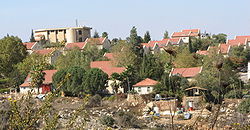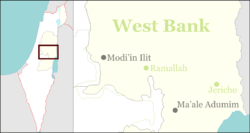- Ofra
-
For other uses, see Ofra (disambiguation).
Ofra 
Hebrew עֹפְרָה Founded 1975 Founded by Gush Emunim Council Mateh Binyamin Region West Bank District Judea and Samaria Area Coordinates 31°57′19.84″N 35°15′36.84″E / 31.9555111°N 35.2602333°ECoordinates: 31°57′19.84″N 35°15′36.84″E / 31.9555111°N 35.2602333°E Population 3,200[1] (2010) Website http://muni.tik-tak.co.il/web/index.asp Ofra (Hebrew: עֹפְרָה) is an Israeli settlement located in the northern West Bank in the jurisdiction of the Mateh Binyamin Regional Council. It is situated on the main road between Jerusalem and Nablus (route 60), 25 km from Jerusalem and has 3,200 inhabitants (2010).
The international community considers Israeli settlements in the West Bank illegal under international law, but the Israeli government disputes this.[2] On the basis of the conditions established in the Sasson Report, Ofra is also unlawful according to Israeli law, as the settlement lacks building permits and a specified area of jurisdiction,[3] and at least 58 percent of the settlement's built-up area is registered in the Land Registry Office under the names of Palestinians, according to the human rights organisation B'Tselem. In September 2011, the Israeli government set up plans to legitimise the settlement retroactively.[4]
Contents
History
Ofra's establishmen in April 1975 was part of a struggle between the Gush Emunim settlement movement, which was founded in February 1974, and the Israeli Labor government, which opposed Israeli settlement amid densely populated Palestinian areas. The name was taken for its biblical aura from a town mentioned in the Book of Joshua.[5] The establishing group from Gush Emunim first obtained jobs at a nearby military base on Mount Ba'al Hatzor, then in April 1975 got permission to sleep over in the abandoned barracks of a Jordanian army base.[6][7] They then brought in their families and raised an Israeli flag. Though opposed by then Prime Minister Yitzhak Rabin, Ofra was given political backing by Shimon Peres, then defense minister in Rabin's government, and by his settlement adviser Moshe Netzer.[8] After the Labour Party was defeated by the Likud Party in the 1977 Israeli election, the new government recognized Ofra as a community, paving the way for expansion into the surrounding hills.[9] It was designed as an "island" for a selected homogenous population, where all members would share the same "ideological-social background."[10]
Many institutions of the Jewish settlers in the West Bank were first located or established in Ofra, including the Yesha Council and the Nekuda monthly magazine.[citation needed]
The location of the settlement Ofra is believed[citation needed] to be close to the site of biblical Ophrah, also known as Ephron and Ephraim.
Geography
Ofra is situated east of the Israel-Westbank separation barrier, 15.1 kilometers from the Green line[11] in the mountain-range area at 850-900 meters above sea level. The climate is mediterranean-mountainous. Cold and humid winters with several days of snow almost every year and a rain yearly average of about 750 millimeters (29.5 inches). The summers are dry and mild.
Ofra is situated in a karstic region, with several stalactite caves and dolinas. The Center for Cave Research (HaMerkaz Lekheker Me'arot) is located in Ofra.
The town is divided into three main neighborhoods: Neve David, Giv'at Tzvi and the core of the town, which is itself divided into four sections. In addition there are three caravan neighborhoods and another neighborhood ("HaShkhuna HaZmanit", lit. the temporary neighborhood) of houses belong to the Ofra Cooperative Society, rented mostly to newcomers including a community of Bnei Menashe from Manipur and Mizoram.[citation needed]
Neighboring Ofra are the Palestinian villages and towns Deir Dibwan, Ein Yabrud, Silwad, Kafr Malik, Deir Jarir and At-Taybeh, the last is believed to be the site of biblical Ofra.[citation needed]
Economy
Ofra's climate is suitable for growing cherries, nectarines, kiwifruit, grapes and olives. Other branches of agriculture include honey and poultry farming. In the nearby industrial area there are some small light manufacturing workshops of carpentry and welding.
Education
Today there are kindergartens, elementary schools, a girls high school (Ulpana Ofra, established in 1986), a midrasha (Midreshet Shuva) and a field school (a special school for biology environmental studies). The field school holds a permanent exhibition of the fauna of the area and of ancient agriculture. Ofra also has a bird watching center, located in a reservation near the Givat Tzvi neighborhood.
Legal status
Status under international law
Like all Israeli settlements in the Israeli-occupied territories, Ofra is considered illegal under international law, though Israeli disputes this. The international community considers Israeli settlements to violate the Fourth Geneva Convention's prohibition on the transfer of an occupying power's civilian population into occupied territory. Israel disputes that the Fourth Geneva Convention applies to the Palestinian territories claiming that they had not been legally held by a sovereign prior to Israel taking control of them.[2] This view has been rejected as without basis in international law by the International Court of Justice and the International Committee of the Red Cross.[12]
Status under Israeli law
The Sasson Report in 2003 introduced criteria for determining the legality of a given settlement under Israeli law. In June 2007, Haaretz reported that 179 of the 600 buildings in Ofra are considered illegal by the Israeli administration.[13] In a report of December 2008, B'Tselem has argued that while all Israeli settlements in the West Bank are illegal under international law, Ofra is illegal even under Israeli law because it violates 3 of the 4 established criteria for legality in the Sasson report. Although Ofra was authorized in 1979, it was never defined a jurisdictional area, never had an outline plan approved and no lawful building permits were issued. According to B'Tselem, large parts of the village also lay on registered privately owned Palestinian land.[9]
References
- ^ "Table 3 - Population of Localities Numbering Above 2,000 Residents and Other Rural Population". Israel Central Bureau of Statistics. 30 September 2009. http://www.cbs.gov.il/population/new_2010/table3.pdf. Retrieved 29 January 2010.
- ^ a b "The Geneva Convention". BBC News. 10 December 2009. http://news.bbc.co.uk/2/hi/middle_east/1682640.stm. Retrieved 27 November 2010.
- ^ Shragai, Nadav; AP (22 December 2008). "B'Tselem: 58% of Ofra settlement built on Palestinian land". Haaretz. http://www.haaretz.com/news/b-tselem-58-of-ofra-settlement-built-on-palestinian-land-1.260016.
- ^ "Civil Administration tries to legitimize the Ofra settlement retroactively". B'Tselem. 19 September 2011. http://www.btselem.org/settlements/attempt_to_legitimize_ofra. Retrieved 17 October 2011.
- ^ Gershom Gorenberg, 'The Accidental Empire: Israel and the Birth of the Settlements, 1967-1977, Henry Holt & Co., 2006 p.312
- ^ Gorenberg, The Accidental Empire, pp.312-318.
- ^ Benari, Elad (22 August 2011). "Ofra: A Religious and Cultural Center". Arutz Sheva. http://www.israelnationalnews.com/News/News.aspx/147058.
- ^ Gorenberg, 'The Accidental Empire, p.312
- ^ a b Shalev, Nir (December 2008). "The Ofra Settlement - An Illegal Outpost". B'Tselem. http://www.btselem.org/download/200812_ofra_eng.pdf.
- ^ Gorenberg, The Accidental Empire, p.352.
- ^ "Ofra". Peace Now. http://peacenow.org.il/eng/content/ofra.
- ^ Legal Consequences of the Construction of a Wall in the Occupied Palestinian Territory International Court of Justice, 9 July 2004. pp. 44-45
- ^ Fractenberg, Ben (2 August 2009). "VIDEO / Inside Ofra: a settler's perspective". Haaretz. http://www.haaretz.com/news/video-inside-ofra-a-settler-s-perspective-1.281234.
External links
- Ofra website (Hebrew)
- Midreshet Shuva (Hebrew)
- Ofra in Google Maps
Communal
settlementsAlmon (Anatot) · Alon · Ateret · Beit Horon · Dolev · Eli · Geva Binyamin (Adam) · Giv'on HaHadasha · Halamish (Neveh Tzuf) · Hashmonaim · Kfar Adumim · Kfar HaOranim (Menora/Giv'at Ehud) · Kokhav HaShahar · Kokhav Ya'akov · Ma'ale Levona · Ma'ale Mikhmas · Mitzpe Yeriho · Na'ale · Nahliel · Neria (Talmon Bet) · Nili · Nofei Prat · Ofra · Psagot · Rimonim · Shilo · Shvut Rachel · TalmonIndustrial Zones Sha'ar Binyamin Industrial ZoneOutposts Ahia · Adei Ad · Amona, Mateh Binyamin* · Esh Kodesh · Giv'at Asaf · Giv'at Har'el · Harasha · Keeda* · Ma'ale Shlomo · Migron · Mitzpe Dani · Mitzpe Hagit · Mitzpe Kramim · Neveh Erez · Oz-Zion · Yishuv HaDa'at
(*Organised as a communal settlement)Categories:- Mateh Binyamin Regional Council
- Hebrew Bible cities
- Religious Israeli settlements
Wikimedia Foundation. 2010.

